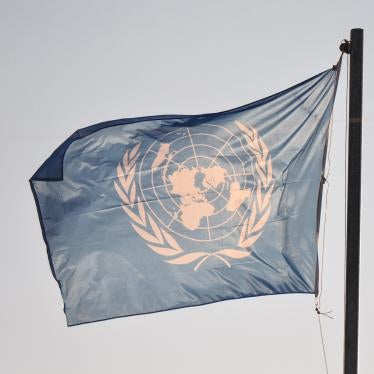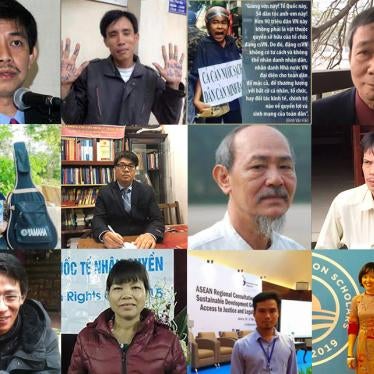Human Rights Watch brings the human rights situations in Somalia, Ethiopia, China, and Zimbabwe to the Council's attention during the June session's General Debate (agenda item 4).
Thank you Mr. President,
Somalia’s civilian population continues to bear the brunt of the country’s protracted and worsening armed conflict. In April alone, Médecins Sans Frontières treated 160 war-wounded people in just one hospital outside of Mogadishu; 65 percent of those victims were women and children. More than 42,000 civilians have fled war-torn Mogadishu since March, bringing to at least 800,000 the number of people who have fled the city since the beginning of 2007.
Just this week the International Committee of the Red Cross called Somalia “the worst tragedy of the past decade.” The tragedy of Somalia can be measured not only in the rising toll of civilian deaths, injuries and suffering, but in international neglect. Serious violations of international humanitarian law continue unabated and there has been no effort to establish accountability for past abuses, many of which amount to war crimes. The resulting culture of impunity has continued to fuel widespread abuses by all parties to the conflict— including extrajudicial killings, torture and extortion carried out by militias and security personnel Linked to the Transitional Federal Government (TFG); indiscriminate killings of civilians by the Ethiopian armed forces; and targeted killings of civilians and civilian government officials attributed to insurgent forces. Human Rights Watch urges member states to underscore the need to end impunity by calling for the establishment of an international commission of inquiry into recent crimes in violation of international law.
Many humanitarian workers worry that a “perfect storm” is building through a confluence of drought; rising food prices fueled both by global trends and by rampant local money counterfeiting; ineffective TFG governance; and severely restricted humanitarian access due to the violent chaos that pervades the country. The results could be catastrophic for Somalia’s civilian population, more than one million of whom are currently displaced.
Recognizing the needs in Somalia, during its last session the Human Rights Council extended the mandate of the Independent Expert. Human Rights Watch welcomes this decision and the High Commissioner’s announcement that an assessment mission will be made in Somalia. Given the gravity of the situation and the HRC’s commitment to Somalia, we believe that it would be appropriate for the HRC to hold a special session on Somalia in September when the Independent Expert and OHCHR could report back on their missions to the country and their findings.
Human Rights Watch is also extremely concerned by the pattern of serious violations of international humanitarian law that we have documented in the Ogaden area of Ethiopia's Somali Regional State. In 2007, in the course of their counterinsurgency campaign against the rebel Ogaden National Liberation Front, Ethiopian troops forcibly relocated thousands of rural villagers and destroyed their homes, executed dozens of civilians, sometimes in demonstration killings, and are responsible for the arbitrary detention, torture and rape of hundreds of civilians in military custody. We urge the Human Rights Council to examine this situation and call for an end to the violence.
Human Rights Watch is gravely concerned by the ongoing violations of human rights in Zimbabwe in the aftermath of general elections that took place on March 29, 2008. We have documented horrific acts of politically motivated violence and torture against opposition Movement for Democratic Change (MDC) activists and perceived opposition supporters by ruling party supporters working closely with state authorities including the army and police. According to scores of victims and eyewitnesses interviewed by Human Rights Watch in Zimbabwe, supporters of the ruling ZANU-PF and “war veterans” are drawing up lists of opposition activists who are then systematically targeted for abuse. Since the March elections, Human Rights Watch has confirmed at least 36 politically motivated killings, and almost 2000 victims of beatings and torture.
Government security forces, and ZANU-PF and its allies are using a network of informal detention centers to beat, torture, and intimidate opposition activists and ordinary Zimbabweans. They are also forcing people to attend abusive “re-education” meetings to swear allegiance to ZANU-PF and denounce those supporting the MDC. Human Rights Watch has documented a pattern of increasing violence by ZANU-PF and its allies and the military, both in the number of incidents recorded and the brutality used. Atrocities reported include torture by mutilation, public beatings of people with sticks, sometimes fatally, and efforts to prevent victims from getting medical care.
Human Rights Watch has strong evidence that military forces are providing arms and trucks to so-called “war veterans” who have been implicated in numerous acts of torture and other violence against opposition MDC members and supporters. The authorities in Zimbabwe rarely investigate allegations of politically motivated crimes and no recent cases of abuse documented by Human Rights Watch have been investigated by the authorities.
The recent collapse in Zimbabwe’s food production has caused a serious food deficit, affecting 4.1 million people (more than one-third of the population). On May 29, President Robert Mugabe announced that Zimbabwe had had to import 600,000 tons of maize to ease food shortages; at the same time decisions to put food aid in numerous regions under the ruling party’s control were taken and announced. Hundreds of thousands of people in rural areas are entirely dependent on food assistance carried out by international agencies. Human Rights Watch has received independent reports that a number of aid agencies have been forced to halt their operations, indicating that the government is imposing its control over food aid country-wide. There are increased reports that food distribution is being used by the Government to affect the election outcome.
At the NGO Forum of the 43rd session of the African Commission on Human and People’s Rights held in May, African NGOs called for the Human Rights Council to take action on Zimbabwe and urged members of the council to organize a Special Session to prevent further violations. Human Rights Watch supports their call and urges the HRC to look beyond political agendas to the human rights issues at hand. The HRC must act swiftly condemn the violations of human rights in Zimbabwe.
Lastly Mr. President, Human Rights Watch expresses its condolences to the victims of the Sichuan, China earthquake. Since last addressing the Council about the Chinese government's use of excessive force in response to the March protests in Tibet, we have seen dozens of Tibetans tried with no due process, and a denial of access to that region by the UN High Commissioner for Human Rights and special rapporteurs. Prominent civil rights lawyers have been stripped of their licenses as a result of their offer to defend Tibetans. Foreign journalists continue to be subject to abuses ranging from death threats to arbitrary detention despite new regulations granting them greater freedoms to report, and the relevant government agencies have done little or nothing to halt these abuses. In the months before the Beijing Olympics, the government continues to violate international and domestic law by expelling from Beijing those it considers “undesirable,” as well as returning refugees from North Korea and elsewhere. Despite the tragedy of the earthquake, this Council must remain seized of the rampant violations of human rights for which the Chinese government is responsible and has not addressed.








